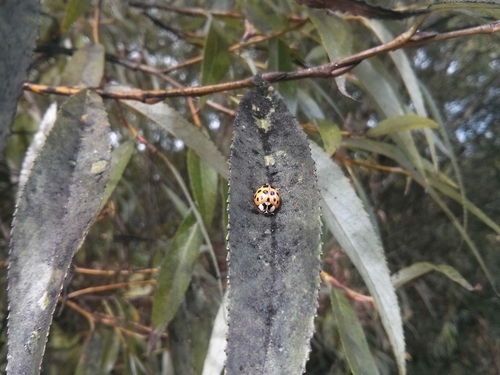Beware the Harlequin

The Harlequin ladybird (Harmonia axyridis), the world's most invasive ladybird, has been detected establishing in Auckland. The biosecurity staff of the Ministry for Primary Industries having been work hard to figure out how far it's already spread. Unfortunately, it's sounding like it's already beyond eradication. That would be bad news for NZ ladybirds as the Harlequin ladybird, an Asian native species, has reached high densities in Europe and North America and displaced their native ladybirds.
We urgently need all sightings of Harlequin ladybirds, and also all other ladybirds so we can assess whether the Harlequin out-competes out native ladybirds like it's done overseas. We've set up a project to do just that: NZ Ladybird Watch. Please join us in recording all the ladybirds we can find.
The Ministry for Primary Industries has produced a useful fact sheet on the Harlequin ladybird and its identification.
It can be confused with the similar looking Harmonia conformis ladybird. Here's what Auckland entomologist Stephen Thorpe (@stephen_thorpe) tells us about how to ID the Harlequin ladybird, Harmonia axyridis: "It is a very variable species (how variable in NZ, I don't know). It is conspicuously larger than the other Harmonia species in NZ. The pronotum is (usually) white, with a symmetrical median black pattern. The larvae have 4 yellow papillae forming a square on the abdomen." If in doubt, just post a photo here and entomologists like Stephen will help with the ID.
You can see all of the NatureWatch NZ observations of Harlequin ladybirds here. Below is a selection to help you know what to look out for.

A Harlequin ladybird in Auckland on 9 April 2016 observed by @jacqui4.
A Harlequin ladybird in Auckland on 19 May 2016 observed by @stephen_thorpe.
Another colour morph of Harlequin ladybird, found in Auckland on 22 May 2016 observed by @stephen_thorpe.
A pupa of Harlequin ladybird, found in Auckland on 22 May 2016 observed by @stephen_thorpe.
A larva of Harlequin ladybird, found in Auckland on 15 May 2016 observed by @stephen_thorpe.








Comentarios
Quick Question. if i find these do i bother squishing them or leave them?
Good question. It's probably not worth it as it's unlikely to make a difference to the local population. It would need to be part of an organised large scale control programme, but it looks like the horse has bolted, at least in the Auckland area.
It's certainly important to record them when you see them, and to record other ladybirds that you see, as it's useful to know which species are being most impacted by this new arrival.
Just found 4 in my garden
We have a number of them attracted to our house lights tonight here in Ruakaka. It would appear that they have spread further than recent articles suggest.
Have found 50 plus in the frame of a window when opening it up and also seen a lot in our firewood bin. Location Motatatu, Northland
Live in Pahiatua and during the summer had a small tree infested with this ladybird, along with wasps.
I saw one in my garden in Lower Hutt today
It's amazing how abundant and widespread these have become in just a short time.
I found one in our back yard here in Nelson yesterday so they have made their way to the South Island. Do i need to notify anyone about these little horrors. It is sad enough that we see none of our beautiful wee ladybirds anymore but these will undoubtedly be the end of our gd ladybugs and we all know how much of a benefit they are in any garden.
On the weekend I found 28 on my courgette plant in Owairaka. It was suffering a bit of white mould so after squashing every one of them, I cut all the mould leaves out. Have just checked again 4days later and the plant is healthy with multiple new flowers/fruit and I couldn't find any ladybirds. However when I popped down to the community garden I noticed several more on the swan plants along with massive amounts of bright orangey yellow aphids??? thoughts?
@broughy It's sad that it's reached Nelson, but difficult to stop. It's still useful to know how quickly it's moving, and to where, to help inform models of potential spread of similar insect pests in the future. It's also still important to keep a close eye on other ladybird species. Do you find less after the harlequin spreads through Nelson? I'm hoping not, but it's a definitely possibility.
@wairakas-mara-kai Good on you for trying. Soapy water can knock back aphids (although not as effectively as insecticides). Still, the real challenge is how to limit the harlequin ladybird without also hurting any other ladybird species in your garden. I'm afraid I don't have a solution for that. It's one of the reasons why this is so tricky to deal with.
I have about 50 inside my little cabin and about 100 outside on the walls, all through my curtains located in motueka-nelson
I have found Asian ladybug 50+ in my sewing room windows trying to get out will now not let them Fairburn Kaitaia
I have found a bunch of yellow ladybird on my property. Not sure if they are the bad ones. I live Central Hawkes Bay.
Suddenly today, I have multiple of these ladybugs on my courgettes and a few on the silverbeet. I'm in Avondale, Auckland.
I have harmonia axyridis overwintering in my house in Oxford, North Canterbury.
Never seen yellow ladybirds until yesterday on the Otago Museum lawn. Yellow and black and twice the size of regular ladybird. My 4yro found 3.
Found a Harlequin in my bathroom today in Dunedin.
Añade un comentario